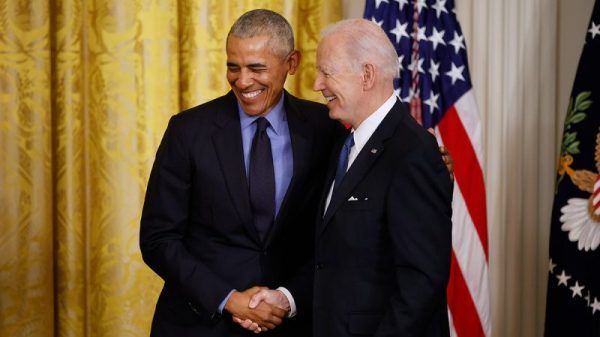The Colorado Supreme Court’s disqualification of Donald Trump from that state’s 2024 primary ballot for engaging in insurrection serves more as a prelude than the main event.
Indeed, the Colorado justices took great pains to emphasize that their opinion probably wouldn’t — and even shouldn’t — be the final word. They instantly stayed their ruling until Jan. 4, just before a key deadline for finalizing the ballot, so the case can be appealed to the U.S. Supreme Court. They also allowed Trump to stay on the ballot after that date even if the matter is merely unresolved; all Trump has to do is file an appeal, and he would remain on the ballot until the high court acts.
The decision, as momentous as it was, amounted to essentially putting the ball in the Supreme Court’s court and inviting it to speak, adding to the high court’s growing list of potentially explosive Trump-related decisions.
And the Supreme Court will speak, either through its action or inaction. That’s because, despite all the litigation on this matter, there isn’t really a road map.
The Colorado district and appeals courts’ rulings on this matter broke ground not just because of the outcome, but because they actually addressed the merits of the central claim. That claim is that Trump is disqualified from office under the 14th Amendment because he engaged in insurrection in his efforts to overturn the 2020 election.
While courts in Michigan and Minnesota previously turned aside challenges to Trump’s ballot eligibility, they did so without considering the insurrection question. Rather, they said the issue wasn’t theirs to decide right now.
The Minnesota Supreme Court’s order last month didn’t even mention the word insurrection, merely saying it was up to the state Republican Party whether Trump would be on the primary ballot.
A Michigan appeals court decision last week agreed with a lower court that the issue wasn’t “ripe” because Trump hadn’t even been placed on its ballot yet.
The Michigan appeals court said that “it is unnecessary to make any determinations regarding whether Trump engaged in insurrection or is actually disqualified from holding the office of President of the United States by the Fourteenth Amendment, at least at this time.”
Colorado state law provided a relatively unusual opportunity for its courts to actually go there. It allows voters to challenge a candidate’s qualifications, even before that candidate is placed on the ballot, if an elected official like a secretary of state is “about to commit a breach or neglect of duty or other wrongful act” by placing them on the ballot. And the law then requires a speedy resolution.
The judges took that opportunity. A state district court judge ruled that Trump isn’t disqualified, but only because a president isn’t subject to the 14th Amendment’s disqualification clause. Still she offered a detailed case for how he did engage in insurrection. The state Supreme Court agreed on the insurrection aspect but said a president was subject to disqualification, disqualifying Trump in a 4-3 decision.
What was also notable about the 4-3 decision is how the dissenting judges, like their brethren in Minnesota and Michigan, didn’t really wrestle with the merits of the 14th Amendment claim.
Each argued that the state’s law didn’t envision the courts so speedily dealing with such weighty and subjective matters of national import. Two of them raised the fact that Trump hadn’t been charged with or convicted of the crime of insurrection — but only in service of arguing that the state law didn’t apply.
Justice Carlos Samour Jr. came closest to addressing federal law when he said he didn’t believe that Section 3 of the 14th Amendment was “self-executing.” In other words, he said, Congress must pass a law detailing how the section is to be enforced, which it hasn’t.
The U.S. Supreme Court, should it take up the case, will be a different animal. It is not charged with interpreting state law. So most of the reasoning in the dissents and in the Minnesota and Michigan rulings won’t apply.
That doesn’t mean it will ultimately wrestle with the question of whether Trump engaged in insurrection; it could reject his disqualification for other reasons. It could say, like the state district court judge did, that the 14th Amendment doesn’t apply to presidents. It could align with Samour in saying that the 14th Amendment isn’t self-executing.
But punting on the merits of the insurrection claim — or failing to at least set a standard for what it means to “engage in insurrection” — would create its own big tangle as Trump heads into his criminal trials.
The Colorado district court and the Colorado Supreme Court have both now said Trump engaged in insurrection. Other judges have walked up to the line of agreeing with that general proposition. The limited polling we have suggests that Americans agree that Trump is disqualified under the 14th Amendment by sizable, double-digit margins. Against that backdrop, it would be conspicuous for the Supreme Court not to delve into that claim in some way.
Leaving this issue unsettled risks its becoming more explosive. Merely saying the 14th Amendment doesn’t apply to presidents would essentially mean insurrectionists are allowed to serve as president. Saying the 14th Amendment isn’t self-executing would still invite Congress to lay out a procedure for disqualifying Trump.
“If we don’t get a final judicial resolution before January 6, 2025 a Democratic-majority Congress could decide Trump is disqualified even if he appears to win the electoral college vote,” UCLA law professor Rick Hasen wrote. “That would be tremendously destabilizing.”
The Supreme Court could reason that weighing in on whether Trump engaged in insurrection might prejudice his criminal indictments (he’s not charged with that specific crime, but is charged with related crimes). But that risks effectively giving the Colorado Supreme Court the final — and really, only — legal word on that matter.
Very few of Trump’s defenders are focused on the merits right now. Rather, they’ve cast this as being about taking down Trump and depriving voters of a choice.
Trump defenders have generally avoided addressing the merits of his actions. That was true of his post-Jan. 6 impeachment, when Senate Republicans acquitted him largely on a technicality. It was true after the search of Mar-a-Lago. It’s also been true regarding his indictments. It’s rarely about what Trump did; it’s almost always about the idea that he’s being targeted.
If nothing else, Colorado has given the U.S. Supreme Court a chance to have that discussion.


































